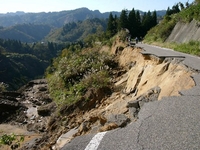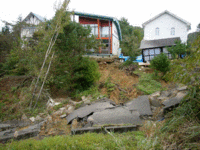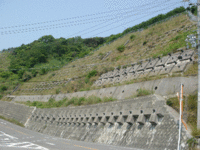Geological Engineering
| Undergraduate Majors | Earth Science Minor | Graduate Programs | Courses |
| Scholarships and Grants | Internship Program | Petroleum Industry Career Path |
GEOLOGICAL ENGINEERING (GE) CAREER OPPORTUNITIES
A career pathway at the interface between engineering and earth science.
 |
 |
 |
 |
Geological engineering integrates two disciplines: geology and engineering. Geologists study the Earth, its composition and structure, its history, and its past plant and animal life. Engineers apply scientific knowledge and experience to design and analyze systems for the benefit of mankind.
Geological Engineers try to answer questions such as the following:
- What are the soils and rocks, and where are the boundaries?
- Where is the groundwater, how much can be used sustainably, and what steps are required to protect and treat this resource?
- How do the soils and rocks respond to different stimuli (e.g., loading, unloading, exposure, flows of fluids, changes in temperature, disturbance)?
- Why do these materials respond this way?
- How can we beneficially control or modify the response of these materials?
Geological Engineers possess the ability and skills to identify and solve Earth related problems that enable them to perform a robust design of structures on soil and rock, to characterize and manage effectively the water resources, to ensure an efficient and safe construction at a site, to develop mitigation strategies against geologic hazards (e.g., landslides, earthquakes, etc.), while, at the same time, protecting the environment and societal interests.
Geological Engineering (GE) is a continuously evolving discipline based on needs of engineers, technological advances and economic changes. Currently, the GE program at the U is placing a strong emphasis on the assessment and mitigation of geologic hazards in addition to groundwater and environmental issues. This is a new direction in response to the Governor Huntsman’s call of finding new ways to achieve a sustainable development in Utah by mitigating risks associated with the occurrence of landslides, mudflows, floods and potential earthquakes in the region, and is driven by an increasing demand for geological engineers trained in dealing with such geo-hazards in Utah.
Graduates from a Geological Engineering program have the advantage that they can fill two positions at the same time: that of a soil/rock/groundwater Engineer and that of a Geologist. Fields in need of Geological Engineers include:
Civil engineering
|
Development of natural resources
|
Water resources
|
Mission Statement and Objectives of U of U Department of Geology and Geophysics
(including our Geological Engineering program)
- To educate and prepare professional Earth scientists, geological engineers and Earth science educators of the highest caliber.
- To educate the University community and the public at large about the composition and structure of the Earth, the dynamic processes that shape the Earth, and the history and possible future of the Earth.
- To engage in scholarly research activities in order to acquire new knowledge of the Earth.
- To disseminate newly acquired knowledge via the timely publication of original research results by faculty and students.
- To provide professional service by gathering and disseminating information regarding natural resources and geologic hazards.
(www.abet.org)
